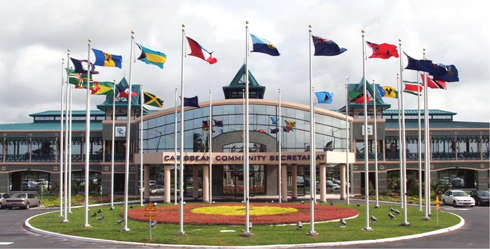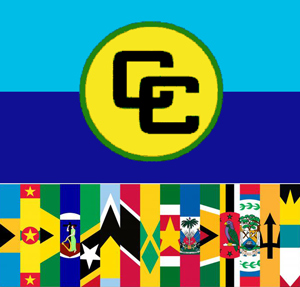By Saeed Shabazz-Staff Writer-

UNITED NATIONS – When a two-day, closed-door meeting between delegates representing the 15-nation Caribbean Community and representatives of the UN ended, what wasn’t discussed appeared more important than what was discussed.
CARICOM Secretary-General Ambassador Irwin LaRocque in his opening remarks told the gathering during the recent Conference of CARICOM heads of government: “Our leaders discussed a framework to generate economic growth and development, recognizing the need to pursue a development path which engenders inclusiveness of all stakeholders.”
However, Mr. LaRocque failed to mention that the heads of government also unanimously established the CARICOM Reparations Commission and mandated that each member nation establish a national Reparations Commission.

“The Reparations Commission concept has tremendous potential to unify CARICOM,” according to David Comissiong, a Barbados-based Pan Africanist and president of the Peoples Empowerment Party. Using reparations as an instrument to provide needed resources for the people of the Caribbean is a good idea, if correctly applied, Mr. Comissiong told The Final Call. He serves on the Barbados National Task Force on Reparations.
“We argue that the legacy of slavery and colonialism in the Caribbean has severely impaired our development options,” said Antigua and Barbuda Prime Minister Baldwin Spencer during his address at the early July meeting in Georgetown, Guyana, headquarters for CARICOM.
“There is a moral and legal imperative for reparations,” the prime minister argued, according to documents released by CARICOM.
According to a 2010 book by Russell King, “People on the Move: American Atlas of Migration,” “The Trans-Atlantic Slave Trade brought African slaves to the Caribbean from the early 16th century until the 19th century; the majority between 1701 to 1810.”
Sugar and gold were the biggest exports from the colonies, according to Malcolm Cross in his 1979 book “Urbanization and Urban Growth in the Caribbean.”
The result of this economic exploitation was a plantation dependence which led to Caribbean nations being settled by a large quantity of unskilled workers, he said. “The sugar production was controlled by the colonial rulers; this left the Caribbean nations with little capital to invest towards enhancing any future industries,” writer Cross added.
According to historians, the British and French each brought over one million Africans to their Caribbean colonies, while the Dutch imported 500,000 Africans.
Prime Minister Spencer told the UN General Assembly in 2011 that the Caribbean Community was calling on “these very states for a new commitment to the economic development of the nations that have suffered” from the human tragedy of the Trans-Atlantic Slave Trade.
However, some Caribbean analysts argue the problem in the region is deeper than the need for reparations, saying the historic dysfunctions and how the nations are governed make many modern-day challenges unsolvable. Some charge insular nationalism and inaction by leaders are still the order of the day.
After 40 years, CARICOM member nations have not cooperated to benefit the 16 million people in the region–despite regional resources that include oil, gas, manganese, bauxite, uranium, gold, diamonds, forestry, tourism, agriculture and fisheries–say critics.
Some also accuse CARICOM governments of taking steps backwards by dealing with financial institutions like the International Monetary Fund and the World Bank as individual states instead of bargaining collectively.
Barbados, considered by some to be the wealthiest nation in the Eastern Caribbean, has a population of 288,725, an unemployment rate of 26 percent and an external debt of $4.49 billion. Jamaica with a population of 2.9 million has a 30 percent unemployment rate and an external debt of $14 billion. Guyana, with a population of 739,903, has 35 percent of inhabitants living below the poverty line. Guyana has 11 percent unemployment and an external debt of $1.8 billion. Trinidad & Tobago, with a population of 1.2 million, has a 10.5 percent unemployment rate, and an external debt of $4.5 billion.
“I have seen nothing new in terms of the vision of Caribbean leaders, who continue to look inward, rather than outward for the solution to our issues,” Mr. Comissiong said. The leaders want to just patch things up, rather than make a fresh start at building genuine nations, he added. “The Minister (Louis Farrakhan) was very clear in that we have to make a new effort in nation building,” Mr. Comissiong noted.
Min. Farrakhan, during his historic December 2011 tour of several Caribbean nations, described how St. Kitts & Nevis was “a great federation” but little “in comparison to what the Caribbean can do when we politically mature to see the bigger picture. And the bigger picture is not just St. Kitts & Nevis, the bigger picture is every island in the Caribbean, including Cuba, including Haiti, the Dominican Republic; the Spanish-speaking, the French-speaking, the Dutch-speaking and the English-speaking, coming together as one nation,” the Muslim leader said.












